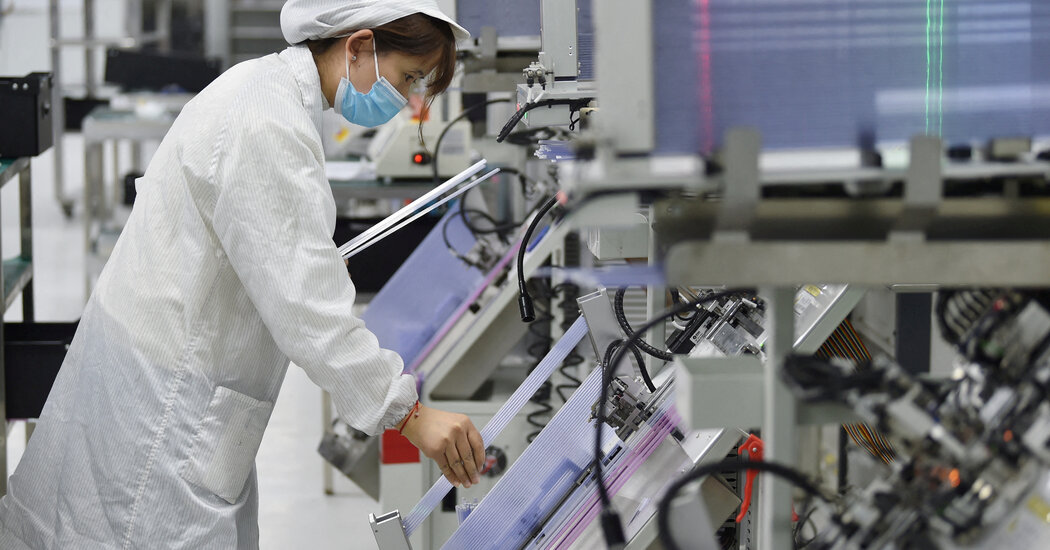A congressional investigation has determined that five American venture capital firms invested more than $1 billion in China’s semiconductor industry since 2001, fueling the growth of a sector that the United States government now regards as a national security threat.
Funds supplied by the five firms — GGV Capital, GSR Ventures, Qualcomm Ventures, Sequoia Capital and Walden International — went to more than 150 Chinese companies, according to the report, which was released Thursday by both Republicans and Democrats on the House Select Committee on the Chinese Communist Party.
The investments included roughly $180 million that went to Chinese firms that the committee said directly or indirectly supported Beijing’s military. That includes companies that the U.S. government has said provide chips for China’s military research, equipment and weapons, such as Semiconductor Manufacturing International Corporation, or SMIC, China’s largest chipmaker.
The report by the House committee focuses on investments made before the Biden administration imposed sweeping restrictions aimed at cutting off China’s access to American financing. It does not allege any illegality.
In August, the Biden administration barred U.S. venture capital and private equity firms from investing in Chinese quantum computing, artificial intelligence and advanced semiconductors. It has also imposed worldwide limits on sales of advanced chips and chip-making machines to China, arguing that these technologies could help advance the capabilities of the Chinese military and spy agencies.
Since it was established a year ago, the committee has called for raising tariffs on China, targeted Ford Motor and others for doing business with Chinese companies, and spotlighted forced labor concerns involving Chinese shopping sites.
The report recommended that Congress curb investments in all Chinese entities that are subject to certain U.S. trade restrictions or included on federal “red flag” lists, as well as their parent companies and subsidiaries. That would include companies that work with the Chinese military or have ties to forced labor in China’s Xinjiang region. The U.S. government should also consider imposing controls on other industries, like biotechnology and fintech, Representative Raja Krishnamoorthi of Illinois, the committee’s ranking Democrat, said.
Sequoia said in June, before the committee announced its investigation into private funding, that it would separate its China arm from its U.S. operations and rename it HongShan. A few months later, GGV Capital said it would separate its Asia-focused business.
Walden did not respond to a request for comment. A representative from GSR declined to comment. GGV provided a list of corrections and clarifications to the report and stated that it had been in compliance with all applicable laws. GGV is also trying to sell its stakes in three companies discussed in the report.
A Sequoia spokeswoman said the firm took U.S. national security issues seriously and had always had processes in place to ensure compliance with U.S. law. The firm completed its split from HongShan on Dec. 31.
A Qualcomm spokeswoman said its investments were small compared with those of the venture capital firms and made up less than 2 percent of the investments discussed in the report.
Officials in Washington increasingly see business ties even with private Chinese technology companies as problematic, arguing that China has tried to draw on the expertise of the private sector to modernize its military.
Committee leaders conceded that many of these investments were made when the United States was encouraging greater economic engagement with China.
“We all made this bet 20 years ago on China’s integration into the global economy, and it was logical,” said Representative Mike Gallagher of Wisconsin, the committee’s chairman. “It just happened to have failed.” He added, “Now, I just I think there’s no excuse anymore.”
The 57-page report draws on information provided to the committee by the firms about their investments, as well as interviews with senior executives at multiple firms.
The committee’s report looked at just some of the funding flowing to China. Between 2016 and July 2023, Chinese semiconductor companies raised $8.7 billion in deals that included U.S. investment firms, according to PitchBook, which tracks start-up funding. That investment peaked in 2021.
Venture capital firms pursued aggressive global expansion, particularly into Asia, for several decades. But they have known since the Trump administration took a more aggressive stance toward China that investments in Chinese companies would be subject to increasing scrutiny.
“No one is touching China now,” said Linus Liang, an investor at the venture firm Kyber Knight Capital.
Splitting off investment entities with ties to China, as Sequoia and GGV did, may not resolve the committee’s concerns that American financing and technology will end up in Chinese companies, the report stated. Sequoia’s newly separated Chinese-based firm, HongShan, counts U.S. investors among its backers. And HongShan and GGV’s new unit, GGV Asia, could still invest in U.S. start-ups, the report said.
Much of the report focuses on Walden International, a California-based company that was one the earliest and most influential foreign investors in the Chinese chip sector. Walden is led by Lip-Bu Tan, a former chief executive of Cadence Design Systems, a chip design firm, and a current member of Intel’s board.
Walden International created various funds for the chip sector in partnership with the Chinese government and Chinese state-owned companies, including a prominent military supplier, the report said.
It was a founding shareholder and early source of financing for SMIC, which is now subject to U.S. trade restrictions because of its ties to the Chinese military. Walden gave $52 million to SMIC over several decades, the committee found, as well as tens of millions of dollars to SMIC affiliates. Mr. Tan also served on SMIC’s board of directors.
He is credited with bringing SMIC and other firms a combination of financing, tools and intellectual property for chip design, as well as profitable connections with customers.
While the U.S. government labeled SMIC a “trusted customer” in 2007, skepticism of the company’s activities has grown in Washington in more recent years. Today, the company is key to China’s ambitions to create a thriving chip sector and lessen its dependence on the United States.
Walden, along with Qualcomm Ventures, the investing arm of chipmaker Qualcomm, invested tens of millions of dollars into Advanced Micro-Fabrication Equipment, or AMEC, a Chinese company that makes the machines needed to manufacture chips. AMEC, a supplier to SMIC and other Chinese chipmakers, is vital to China’s efforts to build up its chip-making industry after the United States placed restrictions on selling China the most advanced chip-making machines.
China’s semiconductor companies are well funded by the country’s government. But ties with U.S. venture capital firms provide Chinese companies with managerial expertise as well as access to technology and the American and European markets. American venture capital firms have also tried to sway U.S. officials and regulators on behalf of Chinese companies in their portfolio, like TikTok.




